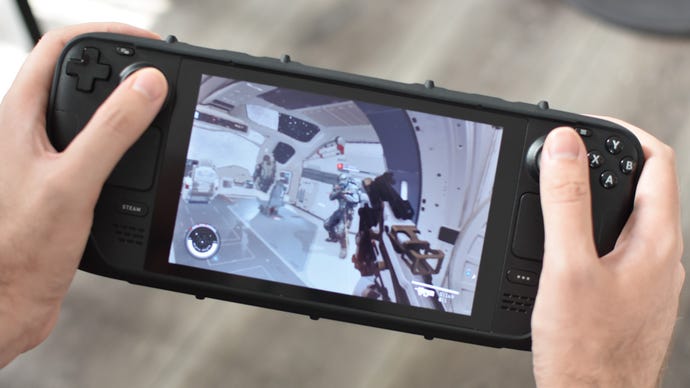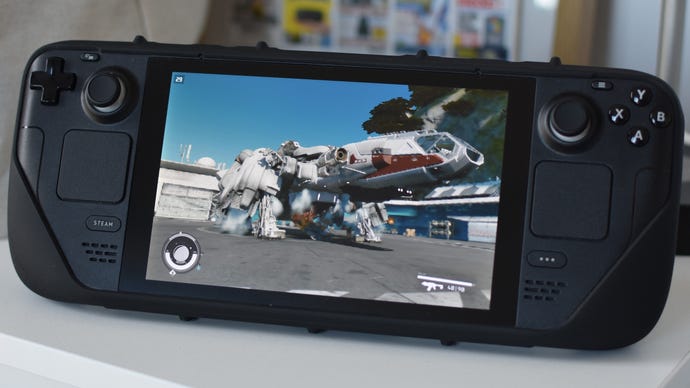Starfield Steam Deck performance report: a frontier too far
She can’t take much more, cap'n
One SteamOS patch and a reinstall later, and I’ve overcome my initial launching woes to properly play Starfield on the Steam Deck. Though perhaps it was better off breaking in the atmosphere, and while I’m enjoying Starfield’s spacey adventures in a general sense, its punishing technical requirements are making the Deck’s usually-plucky hardware look like a pile of Old Earth scrap.
All is not lost for the portable PC, as Game Pass Ultimate subscribers can stream Starfield to their Steam Decks with much slicker performance. There’s also the Steam Remote Play route, and future improvements to native running aren’t out of the question either. Bethesda’s Todd Howard has hinted at a focus switch to handheld play "down the road", and we’ve previously seen fellow AAA megagame The Last of Part I turn around its initially rubbish Deck performance and earn full Verified status, so maybe Starfield could do the same. For now, however, Starfield is just too damned choppy, even with the lowest of low quality settings.
Those include deep, wide cuts to resolution, which on the Steam Deck’s 1280x800 display induces a downright drunken blurriness. Specifically, we’re talking FSR 2 upscaling with rendering resolution set to 50%, plus dynamic resolution enabled. Yet even with these applied to a full set of minimum-quality graphics settings, it’s a regular occurrence for Starfield to drop below 25fps, with frequent stumbles into the 15-20fps range when exploring busy settlements like the gleaming New Atlantis and the cowboy enclave of Akila City. A far cry from Skyrim, which is still one of the best Steam Deck games around.
Even out in space, that 30fps threshold proves elusive. The only times you’ll see anything approaching 'smooth' performance on the Steam Deck is when you’re poking around one of Starfield’s interiors, usually the ones cordoned off by a separate load screen. Still on Maximum Ugliness settings, I’ve seen it climb up to 45fps, with the added bonus of adaptive resolution easing off (thus making everything look less smeared). These are fleeting moments, though. By and large, Starfield chugs on the Steam Deck, and there’s little else that can be down to pick up the pace.

All that said, it’s strangely.. not unplayable? I wouldn’t recommend locally running Starfield on the Steam Deck at all, but I can’t deny that I’ve got a few hours into a new playthrough without being sick or throwing my Deck to the floor in righteous disgust. Maybe it’s the gentle pace and forgiving mood with which Starfield plays out; I hated The Last of Us Part I at sub-30fps because I felt its stuttering was contributing to missed shots and scuppered fights, costing me extremely precious resources in turn. Starfield? Yeah, you can whiff half your magazine at this one space pirate, sure. Couldn’t even see that alien crab because the resolution is fucked? Eh, he’s a slow old thing, you’re fine. Fancy a medkit?
That’s not to excuse how badly it runs on Deck, an issue that extends to its battery life drain: Starfield can suck a full charge dry in 1h 23m, a below-average result even among its big RPG peers. It’s just that if you’re absolutely determined to take it out on the road, then yes, I guess technically you can. It’ll just look like bums.
Speaking of which...

Starfield on Steam Deck: best settings guide
"Least worst settings guide" might be a better name for this section, but for the benefit of anyone who’s willing to endure, it’s still worth running through which adjustments need sorting. Partly because simply choosing the Low preset from the available options will still leave on a few settings that reduce performance slightly, like film grain and depth of field effects.
- Dynamic resolution: On
- Render resolution scale: 50%
- Graphics preset: Low
- Shadow quality: Low
- Indirect lighting: Low
- Reflections: Low
- Particle quality: Low
- Volumetric lighting: Low
- Crowd density: Low
- Motion blur: Off
- GTAO quality: Low
- Grass quality: Low
- Contact shadows: Low
- VSync: On
- Upscaling: FSR 2
- Sharpening: 70% (it’s fine to turn this one up, as it’s just a filter, so doesn’t affect performance)
- Enable VRS: Off
- Film grain intensity: 0
- Enable depth of field: Off
Again, a warning: just because these settings will give you the best Steam Deck performance, does not mean they will not give you good Steam Deck performance. I'd still be more tempted by Xbox Cloud Gaming steaming and its steady 30fps, though I’ll concede that this too has its drawbacks, needing both a premium Game Pass Ultimate subscription and a constant internet connection. It’s also no good if you got your copy of Starfield on Steam, though there’s always Remote Play if you don't actually take your Steam Deck outdoors much.



_RPpOtnt.png?width=291&height=164&fit=crop&quality=80&format=jpg&auto=webp)













